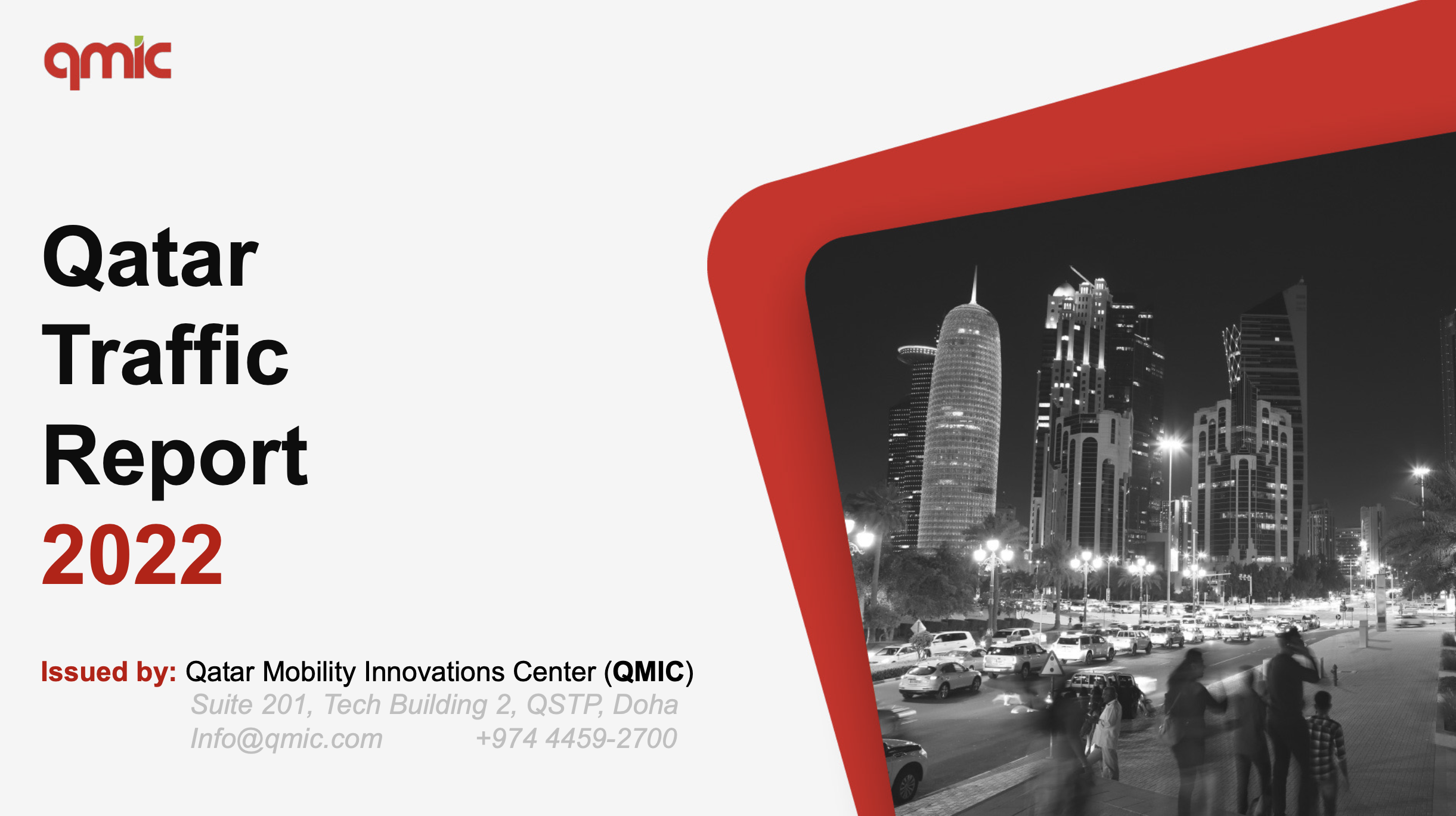
QMIC Announces Key Findings of its 2022 Qatar Traffic Report:
- The road network showed great resiliency during the 2022 FIFA World Cup with a minor increase in congestion levels compared to 2021
- On average, drivers lost 30 Hours in Congestion in 2022
- Overall, congestion level in 2022 was slightly better than that in 2021
Doha, Qatar
The 8th edition of the Qatar Traffic Report, released today by Qatar Mobility innovations Center, provides valuable insight into the traffic trends and patterns in 2022. The report, which analyzed traffic data from 2022 and compared it against previously recorded data from past years indicates a steady decrease in traffic congestion on Qatar’s roads. This report especially sheds light on the traffic behavior during the 2022 FIFA World Cup which was held in November-December.
According to the report, improvements in infrastructure and increased public transportation options have contributed to a decrease in traffic congestion throughout most of 2022 compared to 2021, particularly during peak travel times. This decrease in traffic congestion was realized despite the fact that user mobility has increased in 2022 as all restrictions associated with COVID have been lifted.
Dr. Fethi Filali, Director of Technology & Research at QMIC and who led the QTR team commented by saying, “QMIC’s expanding and unique multi-source data collection network, which gathered over 8.0 billion records of data throughout 2022, a 13% increase from the previous year, is used to generate the annual QTR. This rich data bank, coupled with our proprietary algorithms and data processing capabilities, allows us to draw significant insights and conclusions about the behavior of the road network in Qatar and its impact on the average driver. This also enabled us to provide daily dashboards and insights about road network performance to key stakeholders during the 2022 FIFA World Cup”.
The report highlights several important areas of traffic information, including:
- Jan-Nov 2022 saw a small (~2-3 percentage points) decrease in congestion compared to 2021.
- The FIFA World Cup led to a slight (~1.5 percentage points) increase in congestion during December compared to 2021, with the traffic congestion index varying between 9.3% to 11.1% during Nov-Dec 2022.
- The average number of extra hours spent due to congestion is 30 hours per commuter in 2022 (~36% increase compared to 2021). The increase was primarily attributed to commuters driving significantly more in 2022 compared to 2021, as there were no COVID-19 restrictions in place and commuting patterns returned to normal.
- The economic cost (lost productivity) of congestion in 2022 is estimated to be ~0.3% of GDP (compared to ~0.26% 2021). This is significantly below global averages which are on the order of ~1% of GDP.
- February 2022 remained as the most congested month in the year with a Congestion Index of 11.9% (3 percentage points less than February 2021), while July was the least congested with an 8.1% Congestion Index.
- The highest congestion period during the workdays is the evening peak (around 6-7pm) during which the average congestion index is around 10.6%
- It is noticeable that Friday and Saturday have different traffic trends, while Thursday during the workdays has a slightly different trend as well.
Omar Mohamad Al-Jaber, Director of Strategic Partnerships and Outreach commented, “With 8 editions released, QTR is becoming an important indicator of traffic trends, progress towards reducing congestion, and a score card for traffic management during mega events. This serves as a valuable outcome for any country or region, as it aids in the measurement and alignment of the road network and assists stakeholders and decision makers in determining optimal traffic policies and procedures. This, in turn, facilitates better urban planning and enhances traffic conditions, particularly as the population continues to expand”.
The QTR is a crucial component of QMIC’s locally developed and comprehensive mobility data platform. The platform offers an integrated suite of services encompassing Intelligent Transport, Road Safety, and Smart Logistics/Telematics. Along with its analytics platform, advanced GIS layers, and proprietary technologies, the platform includes a sophisticated multi-source data collection network. This network comprises a large, fixed sensing network that employs QMIC’s WaveTrafTM road traffic sensors, Telematics devices installed in fleet vehicles, and crowd-sourced data from thousands of Wain mobile application users.
QMIC is dedicated to expanding its data collection network to incorporate more comprehensive and informative tools. Additionally, QMIC aims to provide a vast range of related applications and services as a component of its intelligent mobility data and analytics platform.
About QMIC:
The Qatar Mobility Innovations Center (QMIC) is the first independent innovations center in the region with a focus on using R&D to develop and deploy Intelligent Mobility and Smart Cities platforms and technologies. QMIC’s main goal is to use locally engineered innovations & knowledge to enable creating home-grown technology industries that address national strategies and tackle regional emerging challenges. It was founded by Qatar University in 2009 and is registered and licensed to operate as a technology innovations center from the Qatar Science and Technology Park (QSTP).
Since 2009, QMIC has been utilizing emerging technologies including Internet of Things (IoT), Artificial Intelligence, and Location-Awareness to deliver data-centric platforms and services. In particular, QMIC has been leading in delivering platforms & solutions focusing on key domains including Intelligent Transport, Logistics & Telematics, Road Safety, and Connected & Autonomous Mobility (CAM).
Through its integrated innovations development & delivery model, QMIC represents a unique and important category within the national Research & Development & Innovations (RDI) enterprise in Qatar that is strategically driven, R&D-based, solution-focused, and business-oriented
For further information please contact Mr. Abdulrahman Ajjawi
Email: [email protected]
Phone: +974 55645390, +974 4459 3694